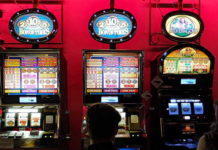
Take a little glamour, a little decadence and a good selection of promising sweepstakes, mix them carefully and make them accessible to mankind. The result is a guaranteed pleasure with addictive potential. The concept of casinos all over the world is bearing fruit and generating the same enthusiasm among all sections of the population.
Gambling has always been one of mankind’s oldest passions and an indispensable part of everyday life. The desire for power, victory and prosperity is the main reason why people like to have their hair cut. Driven by gambling fever, people try to reach the optimum at all times, both in everyday life and at work. Even in childhood, boundaries and classifications are tested and exhausted on a daily basis. “Betting on it” is part of children’s games, youth courage tests and interpersonal rivalries. Therefore, casinos have become an important part of the entertainment industry.
Both offline and online, people seek their happiness in the form of prestige, success and fortune. Those who are challenged in battle or in play are always anxious to give their best. Bets are placed in casinos, on the Internet or on race tracks just in time. In view of these positive associations, it is obvious that bets of various forms are tasted with all intensity.
No one can say exactly when humanity started playing.
The oldest dice and game pieces come from China and Egypt and date back to 3000 BC. The restrictions, penalties and prohibitions associated with the game are as old as the game itself. Even today, gambling is completely banned and punished in some countries, but still enjoys great popularity. What’s forbidden is fun. So it’s no wonder that gambling has spread rapidly throughout the world over the last few centuries and that it has not been undermined by reprisals.
In Greek mythology and Roman antiquity there are important developments for the emergence of gambling and the resulting casinos. For example, Zeus, Poseidon and Hades cut through the universe and in ancient Rome legionaries surrounded their shields with lances. The Romans in particular were enthusiastic players who, despite the prohibitions of the game, did not let themselves be deterred from setting their wages. The ancestors of the Germans had such a special inclination to play that they even let themselves be buried with their play equipment in order to be able to challenge a possible competition even after death. Gladiator fights in specially designed arenas and amphitheatres, which strengthened social cohesion and provided entertainment, were however respected and by no means disapproved.
In reality reserved and punished only for the upper class, people of all social classes were already enthusiastic about gambling and betting at that time. However, through selective taxes and levies the rulers profited in the time after the competition from their people. However, through bans and restrictive measures, gambling increasingly disappeared from public attention in the Middle Ages and took place mainly in specially equipped inns or gambling halls. Both the clergy and the holders of government power considered the development of the game questionable and banned it from the lower classes.
However, card games were also very popular in churches and monasteries. Thanks to two different standards.
In the 14th century the first gambling houses were built on the basis of a concession to which at first only the upper classes had access, while the lower classes gathered in taverns, for example, in spite of sometimes severe punishments. In addition to dice games, card games became more and more popular. The import of cards into Europe led to rivalries, murders and fraud, which in turn led to bans and taxes on gambling.
The first public casino opened its doors in Venice in the 17th century. The “Ridotto” was the beginning of an era of casinos with more than 100 casinos throughout Italy. Most casinos were operated by private individuals who needed a license to do so. The institutionalisation of gambling in Europe dates back to the 18th century. The first German casino was opened in 1720. The French Revolution brought the gambling metropolis, originally located in France, to Germany, and the casinos in Baden-Baden and Aachen were particularly popular. The additional income and the high number of visitors caused an economic boom at that time. However, with the expansion of the Kingdom of Prussia, more and more of the profits had to be paid into funds for healing and beautification.
The founding of the casino in Bad Homburg in the 19th century was another boom that made it the most successful casino of its time. In 1863 the Casino de Monte Carlo finally became the “world capital of luxury and gambling”. With the legalization of gambling in 1931 in Nevada followed the famous Las Vegas casinos, which are still today a tourist magnet. More than 40 million visitors come to Las Vegas every year to be part of the gambling paradise with its extravagant shows and of course the countless “Wedding Chapels”.
At the end of the 19th century, the first slot machines were developed in the United States. This new form of gambling also found favour beyond the borders and gradually gained acceptance in Europe. Due to the regulation of gambling in the German Reich and in the Weimar Republic, however, only games of skill were permitted at first, so that the first slot machines on German soil also functioned without cash.
In Germany, the ban was lifted at the beginning of the 20th century by the National Socialists, although in the course of the 20th century only Baden-Baden received a concession. Since 1950, the casino in Baden-Baden, which was closed at the end of the Second World War, has belonged to the “crème de la crème of European casinos”.
What about today?
In times of media diversity, gambling has also shifted to the Internet. The advantages are obvious: you can place bets from home without dress code, annoying communication and cash bets and sometimes even track them in real time. Regardless of time and place, you can play 24 hours a day and challenge your luck. To keep the entry hurdle for new users as low as possible, many online casinos and bookmakers advertise bonus promotions for the perfect start to the ultimate casino experience. The potential for addiction is guaranteed.
The world is playing. Whether in local casinos or in the virtual world. And the history of gambling shows that prohibitions come and go, but gambling is booming. Because the fascination remains.













